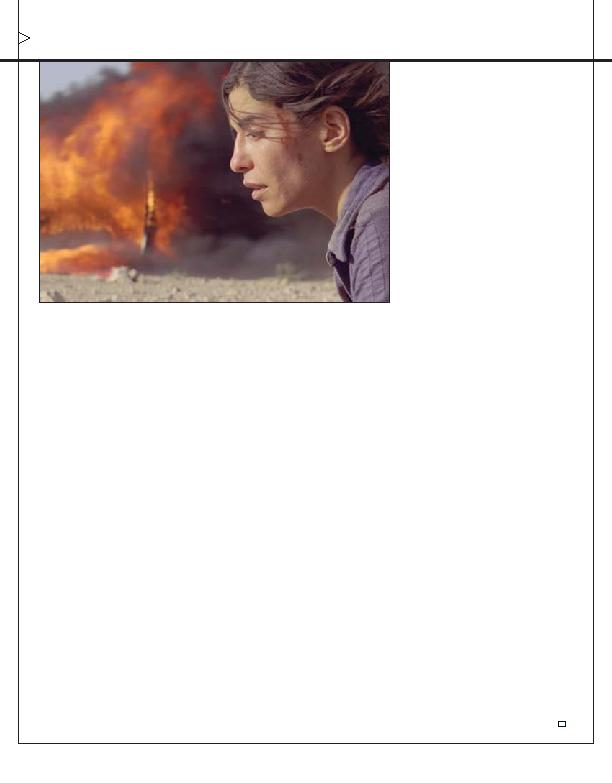
nal language of their source material. Not so
with director Denis Villeneuve's Incendies, an
image-driven adaptation of an incredibly
dense, dialogue-heavy play by celebrated
Lebanese-Canadian writer Wajdi Mouawad.
the original show. His film -- which earned
rave reviews at the Venice, Telluride and
Toronto film festivals and has since been sub-
mitted as Canada's official Oscar foreign lan-
guage entry -- is the exact opposite. In place
of a series of long, one- and two-page mono-
logues, the words are sparse and minimal;
meanwhile, on-screen, the near-empty space
of the stage opens up to a sequence of ar-
resting, unforgettable images.
theater in Montreal, "but I was just totally as-
tonished by the story and how powerful it
was." Moved by the play, Villeneuve met
Mouawad for coffee the following day and
proposed making "Incendies" (aka
"Scorched") into a film, but the playwright
was skeptical, having personally directed a
film version of "Littoral," the first installment
in his politically charged trilogy.
the horrors of Lebanese history -- Incendies
tells the story of Nawal, a Middle Eastern
woman whose peculiar will triggers an inves-
tigation into her past. According to her final
wishes, Nawal asks to be buried in an un-
marked grave until her grown daughter and
son are able to erase her shame by each deliv-
ering a letter to their father and brother.
Mouawad spelled out the obstacles ahead: In-
cendies was too big to put on screen, the play-
wright explained and, besides, it was set in an
imaginary land (based on Lebanon, but re-
imagined for artistic effect), which would be
difficult to translate to film.
suggested by the play and sent them to
Mouawad. "It was a total brainstorm," Vil-
leneuve remembers. "I pitched him an orgy of
images inspired by different scenes and ideas
from the play, like the opening scene where
the kids are being shaved by military men --
that's not in the play, but he loved it."
as he understood that it would be a lonely and
difficult journey. According to Villeneuve,
Mouawad told him, "I suffered a lot writing
`Incendies,' and you're going to suffer, too."
for Paris to work on his next play.
Canadian with no personal ties to the Middle
East. "I had been saying to myself, `When I
get the rights, it will take me three months,'
but the truth is it took me six months before
I put one word to paper," says Villeneuve,
who used research and meditation to find
the right angle.
entry point. Villeneuve kept four key char-
acters and started rebuilding the story
around that idea. "I had to modify it a lot in
order that it became cinema," says the direc-
tor, who claims he hates flashbacks in films.
"What I liked about the structure of the play
is how it captures the feeling of two present
times." Where another director might have
chosen separate looks for these sequences,
Villeneuve invited a measure of confusion as
the story moves back and forth. "It's written
like this in the screenplay, as a game of space
and time," he says. "It's like there are ghosts
or echoes, which creates a kind of dialogue
between the characters."
According to Villeneuve, his goal was to
make a totally silent movie, though it was ul-
timately easier for the characters to describe
things he couldn't afford to show because of
budget constraints.
acters in the movie are 10,000 times more
contained," says Villeneuve, who found that
by taking a line here and there from
Mouawad's "beautiful poems," then trans-
lating the rest into images, he could elicit the
emotional response he wanted -- almost like
a form of visual haiku.
with the images you are putting on the
screen," Villeneuve says. Rather than staging
the most violent scenes (described in graphic
detail in the play), the director decided to
show just enough to suggest their horror, pre-
ferring to feature silent, introspective mo-
ments in which the characters digest what
they've experienced (such as the bus massacre
Nawal narrowly survives) -- a strategy ac-
counted for in advance at the screenplay level.
"Cinema for me is about images. It's always
beautiful when it can be done without dia-
logue," he says. "It's a link with poetry."